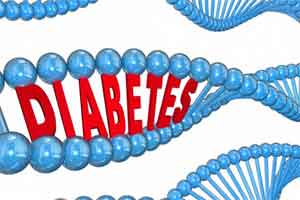- Home
- Editorial
- News
- Practice Guidelines
- Anesthesiology Guidelines
- Cancer Guidelines
- Cardiac Sciences Guidelines
- Critical Care Guidelines
- Dentistry Guidelines
- Dermatology Guidelines
- Diabetes and Endo Guidelines
- Diagnostics Guidelines
- ENT Guidelines
- Featured Practice Guidelines
- Gastroenterology Guidelines
- Geriatrics Guidelines
- Medicine Guidelines
- Nephrology Guidelines
- Neurosciences Guidelines
- Obs and Gynae Guidelines
- Ophthalmology Guidelines
- Orthopaedics Guidelines
- Paediatrics Guidelines
- Psychiatry Guidelines
- Pulmonology Guidelines
- Radiology Guidelines
- Surgery Guidelines
- Urology Guidelines
Diabetes is associated with an increased risk of cancer and reduces post-cancer survival

Having diabetes is linked with an increased risk of developing a number of cancers as well as poorer survival following a cancer diagnosis.
The findings, being presented at this year's European Association for the Study of Diabetes (EASD) Annual Meeting in Berlin, Germany (1-5 October), come from a large observational study comparing over 450,000 people with type 2 diabetes with more than 2 million matched controls over an average of 7 years.
For the most common cancers, individuals with diabetes face a 20% greater risk of developing colorectal cancer and a 5% higher risk of breast cancer compared with their diabetes-free counterparts. People with diabetes already diagnosed with cancer also fare worse, with a 25% and 29% higher chance of dying following a breast and prostate cancer diagnosis (respectively) than their peers without diabetes.
More than 415 million people are living with diabetes worldwide--equivalent to 1 in 11 of the adult population--and this figure is expected to rise to 642 million by 2040. Previous research has suggested a link between type 2 diabetes and an increased risk of cancer. But the relationship between diabetes and cancer remains poorly understood due to limitations of previous studies including residual confounding, investigation bias, small sample sizes, self-reported information, and reverse causality.
To provide more evidence, Hulda Hrund Bjornsdottir from the Swedish National Diabetes Register (NDR) , Sweden, and colleagues examined the incidence of a number of cancers and post-cancer mortality in 457,473 individuals with type 2 diabetes from the NDR between 1998 and 2014, compared to 2,287,365 gender-, age- and county-matched controls from the general population over an average of 7 years follow up. The researchers adjusted for a range of factors that could have influenced the results including age, sex, education, marital status, and income.
A total of 227,505 people developed cancer over the follow-up period. Diabetes was associated with 11 out of the 12 specific types of cancer investigated in the study.
Diabetes was clearly linked with higher risk of cancers of the liver (people with diabetes were 231% more likely to be diagnosed with liver cancer than those without a history of diabetes over the study period), pancreas (119%), uterus (78%), penis (56%), kidney (45%), gallbladder and bile ducts (32%), stomach (21%), and bladder (20%). There was evidence that those with diabetes were at a reduced risk of prostate cancer (18%) compared to their peers without diabetes. The absolute 5-year risk of developing cancer for the cancer sites highlighted in the study ranged from 0.02% for penis cancer to 1.45% for prostate cancer for people with diabetes.
In addition, for individuals with diabetes, mortality was higher for prostate (29% higher), breast (25%), and colon (9%) cancer compared to their diabetes-free counterparts.
The authors emphasise that although the relative risk of cancer is increased after diabetes, the absolute risk increase is low. "Our findings do not suggest that everyone who has diabetes will go on to develop cancer in later life", says, Bjornsdottir, who led the study.
The findings also suggest that cancers of the pancreas and lung are a growing problem in people with type 2 diabetes. Over a 10 year period, diabetics showed a 38% greater increase in new cases of pancreatic cancer, a 30% greater increase in lung cancer incidence, whereas there was a 26% decrease in uterus cancer incidence compared to their peers without diabetes. For the other cancer types highlighted by the authors, incidence remained similar in people with and without diabetes over the study period.
"Diabetes and cancer share certain risk factors that might contribute to these associations including obesity, smoking and diet are examples of likely key factors", says Bjornsdottir. "However, we assessed the relative importance of 14 risk factors collected in routine practice and found that they contributed very little to cancer prediction."
She adds, "With the number of people with type 2 diabetes doubling over the past 30 years our findings underscore the importance of improving diabetes care. Eating a healthy diet, getting plenty of exercise and maintaining a healthy weight are important factors in diabetes prevention and furthermore cancer prevention. With diabetes being associated with an increased cancer risk and mortality the importance of a healthy lifestyle is clearer than ever. It's also important for health professionals and the public to be aware of the link between diabetes and cancer."

Disclaimer: This site is primarily intended for healthcare professionals. Any content/information on this website does not replace the advice of medical and/or health professionals and should not be construed as medical/diagnostic advice/endorsement or prescription. Use of this site is subject to our terms of use, privacy policy, advertisement policy. © 2020 Minerva Medical Treatment Pvt Ltd